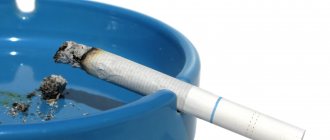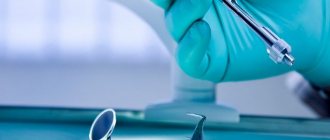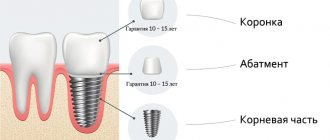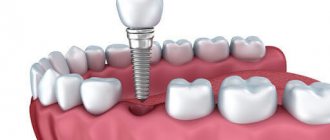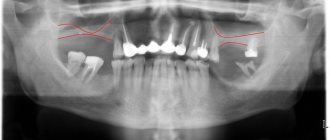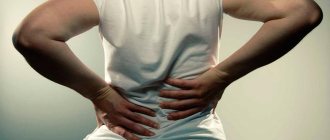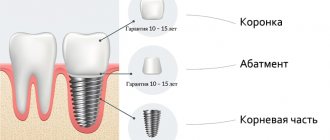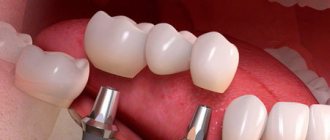748
Restoring the completeness of the dentition through the implantation of implants is considered by dentists to be the best solution to the problem of missing teeth.
The success of this process depends not only on the professionalism and experience of the doctor, but also on the correct implementation of the recommendations by the patient.
Among the list of rules regarding oral care, behavior, and lifestyle, special attention is given to recommendations for diet and menu planning after implantation.
Postoperative period
First, after completion of the operation, food intake is allowed only after one and a half to two hours.
Such a time limitation is due to the fact that eating food immediately after coming home is dangerous due to the divergence of the seams, and the entry of food particles and pathogenic microorganisms into the tissues and bloodstream through an open wound.
This development of the situation leads to complications and negative situations associated with the quality of osseointegration.
When implantation is carried out using the express method or the basal implantation protocol, food intake is allowed within 1 hour after the end of the operation.
Important! You should not eat until the anesthesia wears off completely. Being under the influence of an anesthetic drug is dangerous due to biting soft tissues or burning the mucous membrane.
In cases where implantation was performed under general anesthesia, eating is allowed only 4 hours after the operation.
The main requirement for food in the postoperative period is to eat only soft, pureed, or liquid food warmed to room temperature .
But to make the wound healing process faster, it is recommended to chew food on the side opposite to the implant.
Numbness
In many patients, anesthesia goes away completely only after 4-5 hours after surgery. After this period, sensitivity returns again. If signs of numbness remain after the required period has expired, then you should be wary. Often these signs may indicate the presence of nerve damage.
- lack of facial sensitivity;
- increased salivation;
- difficulty eating and drinking.
It is recommended to conduct an examination as early as possible. If there is nerve damage, drug treatment is used at the initial stage. Implantation is a dental procedure that can fully restore lost teeth. But you should be prepared for the fact that complications may arise after this procedure. In any case, you need to be observed by a doctor during the first period, who can promptly identify complications and quickly eliminate them.
- When can you drink alcohol after dental implantation?
- Recommendations after dental implantation
- How long does it take to get an implant after tooth extraction?
- When can implantation be done after tooth extraction?
DETAILS: Where is it better to get dental implantation and where is it cheaper?
Recommended Products
After a dental implant is implanted, the body takes some time to recover and accept the foreign object. The success of this process largely depends on a properly formulated diet.
In the first weeks, the patient’s menu should include the following products:
- Enriched with calcium .
These are primarily fermented milk products (sour cream, natural yogurt, soft cottage cheese, kefir, yogurt, fermented baked milk), which help strengthen bone tissue injured during surgery and quickly restore the body. There are studies that confirm the benefits of vitamin D for the complete absorption of calcium by the body, which is especially valuable during the rehabilitation period. Therefore, dentists additionally recommend taking this vitamin to certain categories of patients (based on test results). - Rich in vitamins . Since solid and tough foods are prohibited for some time, you should give preference to vegetables and fruits with pulp, or eat puree and steam vegetables to preserve vitamins in them.
- They do not affect the artificial root and the operated area . Broths, cereals, purees, pureed soups and products processed in a blender are ideal.
Special recommendations are given by doctors regarding drinking:
- Drink a lot (at least 8 glasses/day).
- The best option is plain water or weakly brewed green tea.
- The drink should be lukewarm.
Modern methods of implantation of chewing teeth and the systems used.
Come here to learn more about the Immediate Load Implant Method.
At this address https://zubovv.ru/implantatsiya/metodiki/nyuansyi-konstruktsiyami-boi.html we will consider Boi systems for dental implantation.
What can you eat
After implantation, experts advise giving preference to soft and quickly digestible foods. It is important that the food is not hot or cold to avoid irritating the healing tissue.
After the implantation procedure, you have to pay attention to what is on the dining table
Solid foods can cause dentures to become dislodged or damaged, or food particles may become lodged in the incisions in the gums. You should chew on the side where the implantation was not performed.
During the rehabilitation period after surgery, preference should be given to broths, cream soups, pureed vegetables and fruits.
Important! To speed up tissue restoration, foods should be rich in calcium: yogurt, sour cream, cottage cheese, kefir.
Restrictions
For the entire recovery period, the following should be completely removed from the diet:
- Spicy and salty dishes , as they provoke irritation of the mucous membrane.
- Solid food . Lump meat, crackers, nuts, and seeds are prohibited. When chewing these products, there is a risk of gum damage, sutures coming apart, changing the location of the structure, and small food particles clogging a fresh wound.
- Cold and hot dishes . Their use can cause burns or damage to weakened mucous membranes. In addition, high temperature increases blood flow, which can lead to bleeding.
- Sweets. They activate the activity of pathogenic microflora and are harmful to the general condition of the oral cavity.
- Acidic foods . Like spicy (salty) dishes, they strongly irritate the mucous membranes.
- Coffee and other drinks that contain caffeine. This substance can quickly increase blood pressure and thereby provoke bleeding. Caffeine also slows down the process of bone tissue repair.
- Alcohol .
All alcoholic beverages are prohibited for 2 weeks. The ethyl alcohol contained in it provokes a large flow of blood into the vessels of the mucous membrane. This worsens the process of tissue regeneration, causes bleeding and aggravates the likelihood of rejection of the artificial root. In addition, you should not combine alcohol consumption with painkillers and antibiotics, usually prescribed by your dentist.
Important! During the entire recovery period, it is undesirable to include fatty foods in the diet because of their difficulty in assimilation by the body, which is already “in shock” at this time.
Can I drink alcohol after getting implants?
To the question “is it possible to drink alcoholic beverages after implantation,” our answer is categorical. NO. See our reasons why we strongly do not recommend drinking alcohol after having implants:
- bone tissue is destroyed, gums heal poorly,
- fusel oil, which is contained in alcohol, slows down the healing process and causes inflammation of the gums, increases the risk of complications - hematoma, purulent inflammation, peri-implantitis and implant rejection,
- antibiotics are prescribed, which means alcohol is prohibited - the combination can be life-threatening,
- inappropriate actions and inability to perform hygiene, because when a person is heavily intoxicated, he cannot control his actions,
- your appetite increases – you can damage your implants,
- your immune system stops working fully,
- you forget that you need to visit a doctor: such situations arise in situations where the patient drinks alcoholic beverages for a long period of time. Shifting the visit to the doctor by 1-2 days (after a month after installation of the implants) is allowed. But in the first week, visits to the doctor should be strictly day-to-day,
- you may lose your warranty.
Please do not read the Internet and do not study the stories of people who wrote that “they drank alcohol after getting implants or a tooth removed and nothing happened.” A lot depends on the amount of alcohol consumed, the nature of the surgery, its complexity, your state of health and the medications prescribed. If it worked for others, this does not mean that you will not have complications either.
Read more about the negative effects of alcohol on the body in our separate article.
Drinking alcohol should not become an obstacle to living a full life and maintaining the results of expensive treatment!
- use electric toothbrushes, since vibrations and excessive pressure during the cleaning process, especially in the first months after implantation, can lead to poor fixation of implants,
- You should also not use dental floss, especially if only a few implants were installed to replace living teeth. After implantation, the gums become less sensitive and when flossing you may not feel when it is time to stop - this can damage the tissue, which will lead to bacteria getting into the area around the installed implants. And this is already fraught with their possible rejection,
- carry out hygienic cleaning in any dentistry - it is very important that the hygienist knows how and understands how to carry out the procedure in the presence of dental implants,
- Eating foods that are too hard: The denture can be damaged if you bite off hard objects with your teeth, chew pencils, or crack open nuts. Of course, it can be restored, but it is better to prevent such situations from developing.
You will forget about dental problems for the rest of your life! Together with you, we will select the most optimal implantation method and give it a LIFETIME guarantee.
Free consultation
Prepare a sleeping place in advance, stock up on interesting films or favorite music - they will help you distract yourself on the first day after surgery and not focus on every sensation. The body has suffered stress and the tissues begin to rehabilitate – discomfort is normal.
| WHAT TO BUY AT A PHARMACY | WHAT TO BUY | WHAT TO COOK AT HOME |
|
|
|
Proper nutrition during the rehabilitation period is one of the components of successful implantation of an artificial root. The first meal after surgery should be no earlier than 2 to 3 hours later. Light products should be given preference. An option would be:
- soft cottage cheese or yogurt
- omelette (not hot)
- cream soup or broth
- baby porridge
If your health after dental implantation leaves much to be desired (pain, swelling), a cup of chamomile or calendula decoction will be a useful find. The herbal liquid will soothe and relieve discomfort.
It is worth adhering to the diet described above for 5 – 7 days.
It is important not only to follow the recommendations of your dentist, but also to seek help when your health worsens or complications arise. Timely detection of inflammation and taking therapeutic measures will allow you to more effectively solve the problem.
You need to carefully monitor the following postoperative manifestations:
- Swelling. In the first week, facial swelling is considered normal. It should gradually decrease after 3–4 days, and by the 7th day it should disappear completely.
- Numbness. It appears only within 3 to 7 hours after surgical procedures. If this symptom lasts longer, there is a possibility that the nerve has been damaged.
- Increased body temperature. The standard “norm” is considered to be 37 degrees, in some patients – up to 38. If the temperature does not decrease within several days, you should consult a doctor.
- Bleeding gums. Only on the first day this phenomenon is within normal limits.
The occurrence of heavy bleeding and suppuration are not typical consequences of surgical intervention, but alarm bells that are strictly not recommended to be ignored.
Dependence on technique
If the patient has undergone surgery to restore only one dental element, then recommendations regarding the composition of the diet and the temperature of the food consumed are retained for the entire postoperative period.
During a procedure that covers only a small area of the dentition, hard and hard foods can be chewed slowly and as carefully as possible a little earlier - after about a week, and only on the side opposite the implant site.
If a temporary prosthesis was immediately placed after the operation, under no circumstances should it be loaded. A temporary crown is not intended to participate in the process of chewing food, and is only needed to restore aesthetics.
Other recommendations are given after restoration of the completeness of the dentition using the immediate loading protocol, i.e. after zygomatic, basal implantation, the “all on 4 or 6” technique.
- You can start chewing immediately after surgery.
- Products should be moderately soft.
- Increase the load on the implant gradually.
- You can return to your normal diet after 3-4 weeks.
Protocols that restore the integrity of the dentition immediately require a load. Due to the fact that when food is fully chewed, metabolic processes are activated between bone cells, which results in rapid restoration and bone growth. At the same time, these processes improve the fixation of the implant in the bone.
Nutrition rules
The main requirement is a minimum load on the implants both on the first day and in the next 2-3 days. The following nutritional rules must be followed:
- do not touch the area of sutures and installed implants with your hands or tongue,
- in the first 3-4 days, limit yourself to oral baths (just hold the solution/water in the mouth), after which you can carefully rinse,
- on days 3-5, that is, after the inflammation and swelling have reduced, you need to start using a toothbrush. The recommended bristle hardness is soft or ultra soft, so as not to damage the gum tissue and the area of sutures,
- introduce toothpaste at the same time as starting to use the brush: Parodontax, ROCS or RasYan Herbal Clove toothpaste (for example, herbal, clove). These pastes allow effective prevention of gum inflammation,
- starting from 2-3 weeks after installing the implants, after each meal, use an irrigator (to begin with, at 1-2 speed, that is, minimum), and finally rinse your mouth with water or an antibacterial rinse.
After implant treatment, be sure to buy a new toothbrush. Do not use the old one - it contains a huge number of microbes and bacteria that can lead to the development of an inflammatory process.
Sample menu
A competent approach to nutrition after implantation is one of the factors that determines the high-quality completion of osseointegration of the structure into the bone tissue.
Therefore, while this process is underway, the patient must adhere to a diet.
Here are the sample menu options in the first postoperative days:
- Breakfast. Pre-chilled porridge: oatmeal (large flakes must be crushed with a blender) or semolina (you can add butter to the porridge), weak green tea (yogurt, preferably natural, or fermented baked milk, lukewarm water).
- Dinner. Mushroom puree soup, mashed potatoes with steamed fish, green tea (chicken broth with egg (preferably pureed), steamed cutlet with steamed rice, compote).
- Afternoon snack. Cottage cheese with kefir (low-fat sour cream), ripe banana.
- Dinner. Vegetable puree soup and green tea (buckwheat porridge (liquid) and compote).
Before going to bed, you can drink yogurt or a glass of kefir.
Already on the 4-5th day it is allowed to introduce liquid cottage cheese into the diet (if it is grainy, you must first mash it with a spoon). For variety, you can add low-fat sour cream to it.
Upon completion of osseointegration, strict dietary restrictions are completely removed. But you need to return to the patient’s usual diet gradually. As before, food should contain foods containing vitamins, micro- and macroelements.
What not to eat after implantation
After implantation, it is strictly forbidden to consume:
- Crackers
- Nuts
- Fried or baked meat
- Ice cream
- Fondue
- Dishes with lots of spices and salt
You should also limit your consumption of black tea and coffee. They can cause increased blood pressure and bleeding from unhealed wounds. You should avoid alcohol; drinking alcohol will slow down the survival of the prosthesis. It is best to drink clean, warm water during the period after implantation.
Diet example
To ensure that the implants take root successfully and the procedure does not cause complications, the following rules should be strictly adhered to.
Immediately after surgery:
- Do not eat food for 2-3 hours
- Then you can eat only soft and warm food, preferably liquid porridges and broths
- Avoid processed foods, peppered and spicy foods
After 1-2 weeks:
- Add fresh vegetables and fruits, ground in a blender, to your diet
- Enrich the menu with fermented milk products
- Include steamed cutlets mashed with a fork into your diet
Such restrictions should be adhered to for 1-2 months. After this, the doctor will examine you and, if he sees no complications, will allow you to gradually switch to solid food.
A month or two after being examined by a doctor. he may suggest a particular diet that should be followed
Based on the recommendations listed, the menu for the day after the implantation procedure will look like this:
- Breakfast: cottage cheese, grated with sour cream, green tea
- Second breakfast: crushed banana or apple, smoothie
- Lunch: mashed potato soup with chicken broth, cutlet, dried fruit compote
- Afternoon snack: cottage cheese with fruit puree
- Dinner: millet porridge, boiled chopped boneless fish, green tea
- Second dinner: kefir
Important! Vegetables and fruits contain essential vitamins and minerals for tissue repair after surgery. And meat, fish and cottage cheese are rich in calcium and protein - the main element in the construction of gum tissue cells and bones. This diet is not only safe, but also helps wounds heal faster.
Importance of Vitamins
In addition to proper selection of products and preparation of a diet for the postoperative period, considerable attention should be paid to the nutritional value of food.
Enriching the diet with foods rich in vitamins, according to experts, accelerates the healing of bone tissue and the implant.
The most important vitamins during this period are:
- Vitamin C (aka ascorbic acid). To increase the strength of blood vessels and the correct formation of connective tissue at the site of insertion of the artificial root.
- Group of vitamins B. All together contribute to the flow of restoration processes in the gums, i.e. accelerate its healing.
- Vitamin D. _ Helps create conditions for the body to fully absorb calcium, which is involved in the restoration of the jaw bone.
- Vitamin E. Prevents inflammation and is a powerful antioxidant.
Stages of All on 3 trefoil implantation and characteristics of structures.
In this publication you will find objective reviews about zygomatic dental implantation.
Here https://zubovv.ru/implantatsiya/metodiki/vozmozhnost-provedeniya-pri-gepatite.html read about the intricacies of dental implantation for hepatitis C.
Let's sum it up
- take antibiotics as recommended by your doctor
- rinse the mouth with antiseptic solutions
- carefully monitor your well-being and the condition of the implant
- give up solid foods, smoking, alcohol
- avoid overheating or hypothermia
- perform hygiene procedures after dental implantation carefully and with a soft brush
- carefully distribute the chewing load so that the operated area is minimally involved.
Rules of care
During the recovery period, the tissues of the oral cavity (as well as the body) are very vulnerable to any mechanical injuries and infections.
If you neglect to follow medical recommendations for the use and care of dental structures, there is a high probability of pathogenic microorganisms entering the wound, leading to inflammation and implant rejection.
Particular attention should be paid to hygiene during this period. Moreover, all actions must be performed with extreme caution:
- When the implantation of an artificial root was performed according to the classic protocol with suturing , you can start brushing your teeth on the 3rd day after the operation.
To do this, you need to use only a brush with soft bristles and go around the operated area. From the first day, use Solcoseryl dental paste - apply to the seams an hour before meals. - After surgery with immediate loading , the gums and jawbone have less damage, but oral care is important.
From the third day, daily cleaning can be supplemented with the use of an irrigator. The device is allowed for use only after placing a prosthetic product on the implant (without it, the surgical area cannot be treated with an irrigator). - To destroy pathogenic microorganisms you need to rinse your mouth with a solution of Chlorhexidine with a concentration of 0.5% for 7-10 days.
The procedure is carried out in the morning after all meals, as well as before bedtime. The action must be repeated three times. But for the first 2 days, rinsing should be kept to a minimum.Do not rinse your mouth with an antiseptic solution, but simply hold it there for 2 minutes. Complete rinsing is possible after the wounds have healed, i.e. in about 3-4 days.
If we talk about restrictions after dental implantation, it is worth noting that a certain category of patients will have to completely reconsider and change their lifestyle:
- reduce physical activity;
- do not visit the sauna (bath);
- quit smoking;
- exclude alcoholic drinks.
It is important to maintain close contact with the specialist who performed the operation. For the first 6 months, the visit schedule is approximately as follows:
- 1st visit after 3-4 days;
- 2nd – a week later;
- 3rd – in a month;
- 4th – after 3 months;
- 5th – six months later.
In the future, if there are no problems with osseointegration, such visits should take place at least 2 times a year.
Important! Regular examinations by the dentist will allow you to monitor the correctness of implantation and the condition of the implant, and promptly identify problems with the remaining natural teeth.
The video provides additional information on the topic of the article.
Why is special care and treatment required after dental implantation?
In the case of implantation, postoperative therapy is divided into two stages.
The first begins immediately after the operation and lasts approximately two to three weeks: this is how long it takes for wounds to heal and stitches to be removed (if any were applied). The second stage is longer and takes on average up to six months. During this time, the implant engrafts into the bone tissue, after which the prosthesis is installed (if we are talking about a two-stage technique). Each stage has its own risks. Despite the fact that implantation today is a reliable and predictable technique, inflammatory processes and even minor mechanical damage to the titanium root can cause rejection. In addition, good condition after dental implantation can be deceptive: patients almost immediately return to normal life, but ignoring the doctor’s instructions and refusing postoperative therapy almost immediately leads to complications. Rehabilitation after dental implantation partly depends on the surgical technique. Implantation can be one-stage or two-stage. The first protocol involves installing a titanium root and a temporary prosthesis in one stage. Classic two-stage implantation (used in the vast majority of cases) follows a different scenario. After implantation into the bone, the implant is sutured into soft tissues or a gum former is placed, and the crown is fixed after the healing process is completed. With a one-stage protocol, the consequences of the surgical stage are usually less pronounced. The implant is installed without making a large incision in the gum or removing the flap. Therefore, severe facial swelling or swelling after dental implantation is less common. However, therapy and oral care are necessary for any method. Next, Startsmile will tell you what you can and cannot do after dental implantation, as well as the specifics of therapy during the recovery period.
Reviews
Dental implantation is a full-fledged surgical operation. Following the recommendations, including those affecting nutrition, will help facilitate tissue healing, help the body recover, prevent complications, and also increase the service life of the artificial root.
You can share your opinion regarding the importance and advisability of following a diet after implantation, or talk about your experience of going through the recovery period, by leaving a comment on this article.
If you find an error, please select a piece of text and press Ctrl+Enter.
Tags implantation
Did you like the article? stay tuned
No comments yet
Are complications possible?
Complications after dental implantation occur in approximately five to six percent of all patients. Moreover, in many cases they themselves are to blame, since they do not comply with the requirements prescribed by dentists. Namely: they do not use antiseptic and wound-healing drugs, do not take precautions when eating, and also do not follow many other recommendations.
Of course, complications can also arise due to the doctor’s inexperience or poor qualifications. Sometimes nerves or even facial arteries are damaged during the procedure. If this happens, the intervention must be stopped immediately. Perhaps this operation is not suitable for you at all. However, each case is individual, so everything needs to be agreed with the dentist. Of course, the risk of complications is minimal, but it still exists. According to patients, there is also a possibility of overheating of the bone tissue. This means that the rod simply cannot take root in the oral cavity.
Complications may arise after the implant is installed. So, a titanium product may not take root or over time it may begin to loosen. In some cases, the bone tissue around it begins to collapse or, conversely, it begins to grow. There is also a risk that the patient may have an individual intolerance to titanium.
Oral hygiene
In the first two days, swelling and pain appear on the mucous membrane when opening the mouth, swallowing, and eating. An increase in temperature to 37.5 °C is observed. After surgery, you should regularly rinse your mouth with antiseptics and antibacterial solutions - they prevent the development of infection.
For the first 8–10 days, it is recommended to apply cotton pads soaked in Chlorhexidine. At the healing site, you should carefully remove food debris with a cotton swab. These are the main recommendations after dental implantation .
Important! You should not brush your teeth with a hard bristled brush for the first 2 weeks after surgery. It is necessary to exclude physical activity (up to a month), flights (7 days). You should not overcool and visit baths and swimming pools.
How to care for implants after the postoperative period
After surgery to install dental implants, various types of complications can develop:
- The appearance of pain in the field of intervention. It is normal for minor pain to occur immediately after implant placement. Typically, this phenomenon is observed immediately after the end of anesthesia and continues for several days. After the operation, the doctor prescribes the patient to take medications that have an analgesic effect on the body. If the pain continues much longer, this may be a signal of the development of an inflammatory process in the soft tissues or nerve damage.
- A natural reaction of the body to surgical intervention is tissue swelling at the site of tooth implantation. It usually occurs a few hours after surgery and can persist for 5-7 days. If tissue swelling persists for more than 7-10 days, this indicates the development of inflammation in the soft tissues of the oral cavity.
- After surgery, patients usually experience some bleeding from the tissue, which is considered normal. The gums may bleed for more than 7-10 days, causing hematoma formation. If the patient develops severe bleeding on the first day after surgery, this may be a sign of injury to the blood vessels of the circulatory system.
- One of the body’s reactions to installed prostheses is a rise in body temperature. If the temperature rises to 37 degrees, then there is no need to worry. This is considered normal after surgery. The persistence of an elevated body temperature of more than 37 degrees for 4-5 days and the appearance of purulent discharge at the site of installation of the dental implant indicates that an inflammatory process has begun in the oral cavity.
- When performing implantation, synthetic threads are used, which help to hold the soft tissue well and prevent the sutures from coming apart. After surgery, it is recommended to periodically inspect the oral cavity and monitor the integrity of the sutures. If a discrepancy occurs, this may indicate mechanical damage or the onset of an inflammatory process.
- Complications may develop during the implant healing period, that is, when the surface of the new tooth fuses with the tooth bone. Often during this period, a specialist diagnoses the development of an inflammatory process in the tissues that surround the prosthesis. This can occur as a result of infection in the area between the gum and the denture.
- In addition, rejection of the prosthesis is possible, which develops due to infectious processes, smoking and lack of bone tissue.
Dental implantation surgery can cause the development of various complications, therefore, in the first two weeks after dental implantation, the following recommendations must be followed:
- You can eat for the first time only 2 hours after the operation, and the food should be soft and semi-liquid in consistency.
- When sutures are placed on one side, it is recommended to chew food with the other side of the teeth.
- The temporary prosthesis should not put pressure on the sutures. If this happens, it must be removed.
- Throughout the entire rehabilitation period, Solcoseryl dental paste is applied to the suture site before meals.
- In the first two weeks after surgery, it is recommended to take any medications that contain calcium.
After the operation, tissue bleeding, swelling and bruising may develop. It is for this reason that in the first two days it is recommended to apply cold to the operated area of tissue for 5-10 minutes and repeat the procedure after 20-30 minutes.
MRI is considered one of the highly effective research methods, the scope of which is quite diverse. This procedure is prescribed to examine the teeth and jaws in order to clarify the diagnosis and justify the need for surgical intervention. MRI is prescribed to examine the condition of soft tissues and cartilage, but not bones.
When prescribing an MRI, many patients with installed dentures are concerned about the possibility of damage to tissues in the oral cavity, as well as implants, when exposed to a magnetic field.
In fact, this opinion is erroneous for the following reasons:
- modern dental structures are made of special alloys that do not react with magnetic fields;
- When ferromagnets are present in the implants, they do not move and do not heat up at all.
The only disadvantage of performing an MRI in the presence of dental implants is the possibility of distorting the results obtained.
Before prescribing and carrying out the procedure, it is necessary to inform the specialist about the presence of prostheses in the oral cavity, which will allow you to change the settings of the device to obtain high-quality images.
The patient's refusal to comply with the necessary oral hygiene is a sufficient reason for the surgeon to reject the method of treatment by implantation.
The desire and ability of the person being operated on to keep their teeth clean is checked before the operation. To do this, the dentist prescribes compliance with certain rules:
- You should completely avoid eating two hours before surgery. But it is not recommended to perform it on an empty stomach, since after the procedure there are also some restrictions and the patient may weaken. To avoid fainting and other unpleasant consequences, you must eat 2.5-3 hours before the procedure.
- Alcohol consumption is completely prohibited at least 24 hours before the start. You may take medicine as a sedative shortly before surgery, after consulting with your doctor in advance. The specialist should know about the intake of all medications over the past 24 hours.
- Immediately before dental surgery, the surgeon will treat the oral cavity with a special solution that kills germs. But to help doctors and reduce the time spent in the operating chair, it is recommended to thoroughly brush your teeth and use dental floss half an hour before the start.
- Self-hypnosis can cure a person in minutes or delay getting rid of a common cold for years. Therefore, experts recommend coming to surgery cheerful and undoubtedly in a positive mood. To do this, you should pay attention to getting enough restful sleep and spending time in the company of loved ones.
Modern dental implantation is a complex multi-stage process that requires careful attention from both the specialist and the patient.
To reduce the risk of developing various complications and rejection of implants, as well as to extend their service life, it is recommended to strictly follow the instructions of your doctor.
It is important to carry out such measures immediately after dental implantation, because it is during the postoperative period that the mucous membrane becomes vulnerable to various infections.
DETAILS: Dental implantation in the absence of bone
Dental implantation is often much easier than the postoperative period.
It is necessary to understand that no matter how wonderful the surgeon who performed the operation is, the introduction of an implant means tissue injury, which can lead to complications.
To avoid postoperative complications, it is very important to strictly follow the dentist’s recommendations during this period.
The condition after dental implantation of the oral cavity is such that it is vulnerable to the development of infectious complications associated with bacteria entering the mucous membrane.
In this regard, in the postoperative period, therapy is aimed at preventing infection from entering the surgical field and accelerating the healing of the wound surface.
Therefore, in the postoperative period, antibacterial drugs are prescribed, both orally and for local use.
Photo: Appearance of the surgical wound two days after surgery
- The appearance of swelling or bleeding in the surgical area. To reduce swelling, ice should be applied to the cheek in the area of the installed implant for twenty minutes every half hour during the first day.
- Your health after dental implantation may suffer due to pain or fever. All these unpleasant sensations are relieved with the help of painkillers.
Within three to five days, usually all these symptoms disappear on their own.
In the post-implantation period, the following complications occur occasionally:
- Having severe pain.
- Increased body temperature.
- Numbness of the jaw.
- Bleeding.
- Hematoma formation.
- Seams coming apart.
- Development of the inflammatory process in the area of surgical intervention.
The main reasons for such complications may be:
- Failure of the patient to follow the doctor's recommendations.
- Violation of technology for preparing and conducting surgical intervention.
- Features of the patient's body.
Photo: Reimplantitis
- Pereimplantitis is inflammation of the tissue around the implant. The bone tissue surrounding the implant is destroyed.
Causes of reimplantitis:
- Hemorrhage over the plug with subsequent development of suppuration.
- Incomplete closure of the surgical wound.
- Violation of the bone bed preparation technique.
- Lack of oral hygiene.
The main method of treatment is to remove the hematoma and eliminate the causes of inflammation.
If treatment fails, the implant is removed and bone tissue is restored.
- Implant rejection. Very rare. The cause of rejection may be the presence of an inflammatory process, a burn of bone tissue during implantation, or bone osteoporosis. In this situation, the implant is also removed.
